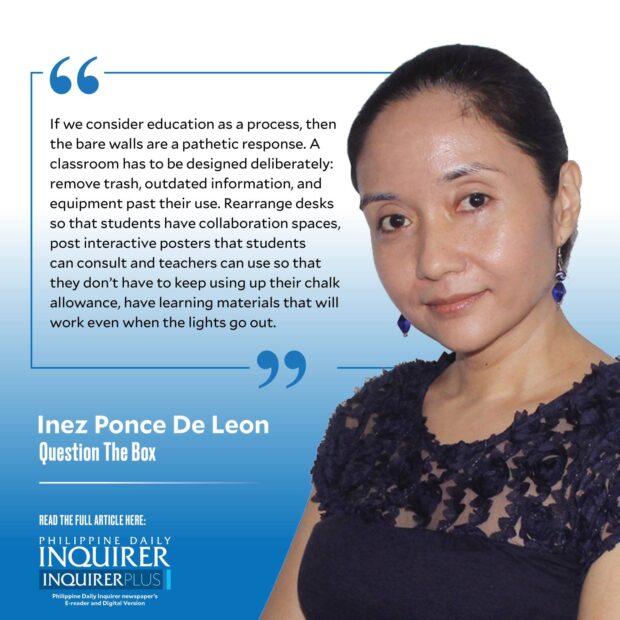Real investment in real education
 With frequent elections and constant bureaucratic shuffling, we’ve probably gotten used to hearing lofty terms to describe public services. Transportation for national growth, science for wealth generation, education for the future.
With frequent elections and constant bureaucratic shuffling, we’ve probably gotten used to hearing lofty terms to describe public services. Transportation for national growth, science for wealth generation, education for the future.
The catchphrases sound nice until they have to prove their worth—and the problem with lofty language lies precisely in its vagueness. Anyone can define the words on their own terms so anyone can find a way to meet whatever goal they choose to fit into the statement.
National growth and wealth generation can mean anything. Develop agriculture? Then make better farm-to-market roads, cut down on middlemen, have more reliable storage facilities, speed up the process from field to table—and more. All those proposals work together, but when vague terms are invoked, simply ticking one task off the list, cutting ribbons, and posing for photo-ops will make people in charge look busy enough to be assured reelection.
Now: the future. Do we mean giving students tools to get good jobs? Then that reduces education to a stepping stone, which makes students go through school for the sake of getting a diploma to put on their resume. Do we mean giving students the chance to contribute to national growth, to wealth generation? Then we keep falling into the trap of using education as a path to an unclear tomorrow, and the whole idea of school loses its purpose.
The problem with relying on such catchphrases, especially for education, is that taxpayers, lawmakers, and policymakers tend to define and extol education for what it represents: a static image of classrooms, lectures, tests, and pieces of paper as a reward.
When education is reduced to these images, it’s also easier to attack.
“The most important lessons are learned outside the classroom because teachers are liars,” says the drunken uncle at the Christmas party. “Lectures are boring,” says the latest video platform, “So here’s 30 seconds of trivia that will make you feel like you know something.” “Make multiple choice exams that are easy to check,” say so-called education experts, thereby socializing students into a world of black and white, where nothing is up for debate and discussion. “Just get that diploma,” says the grandparent who doesn’t invite critique from their grandchildren, “And then get a job or get married.”
When education is reduced to mere representation, then we also have policies that reduce all problems to a paranoid base. Confidential funds to reportedly track down teachers closely aligned with leftist groups that supposedly use the classroom to recruit students into rebellion. Mandatory military training to purportedly instill discipline and nationalism in students. A streamlined curriculum that is probably going to do—what?
When education is reduced to an image, then we forget that education is a process. When we forget that education is a process of growing children’s mental skills, their ability to interact with each other, and their love for lifelong learning, then schooling indeed becomes useless.
Last week, my fellow Inquirer columnist Anna Cristina Tuazon and I both tackled the issue of stripping classrooms to their bare walls. Her analysis was both nuanced and forceful: Students are not in school to simply absorb information; they have specific needs that have to be met at each developmental stage, whether it’s learning how to talk to their peers or to reflect on their learning, writing about their experiences, or refining their motor skills.
A bare wall is, once again, a blanket solution to imagined problems. It avoids the stinging question: What have we been doing to make students learn AND love learning?
If we consider education as a process, then the bare walls are a pathetic response. A classroom has to be designed deliberately: remove trash, outdated information, and equipment past their use. Rearrange desks so that students have collaboration spaces, post interactive posters that students can consult and teachers can use so that they don’t have to keep using up their chalk allowance, have learning materials that will work even when the lights go out.
Let students love reading, writing, and thinking. Encourage even parents to read and discuss with their children at home.
Train teachers better. Pay them better.
Difficult? Costly? Of course. Real education is a challenge, not a reelection tool; it is an investment in a long-term process, not a donation to a representation. It has to exist in an infrastructure that recognizes its benefits rather than perceives it as a burden to a vague somewhere.
It’s easy to push blanket solutions when one has neither stake nor expertise in education. It’s more difficult to propose and implement detailed policies, even if they’re expensive, even if they need a larger budget that has to be transparent and known to all.
Then again, isn’t that what education should have taught us? To search for the truth and demand accountability? To recognize abuse? To speak up against injustice?
Or has it failed even in that?
iponcedeleon@ateneo.edu




















